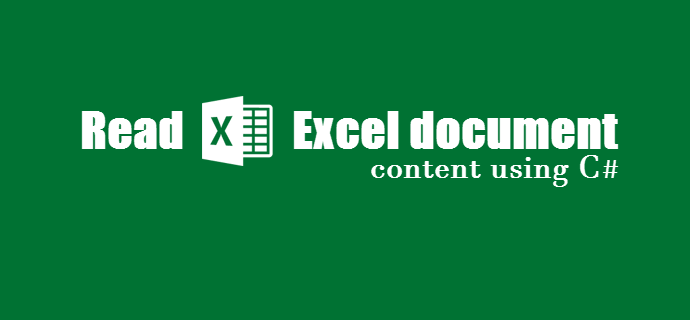How to read Microsoft Excel document contents using C#/.NET?
Recently, we learned how to read text contents of Microsoft Word document from a .NET application using the APIs exposed in ' Microsoft...- Article authored by Kunal Chowdhury on .
Recently, we learned how to read text contents of Microsoft Word document from a .NET application using the APIs exposed in ' Microsoft...- Article authored by Kunal Chowdhury on .
Recently, we learned how to read text contents of Microsoft Word document from a .NET application using the APIs exposed in 'Microsoft.Office.Interop.Word.dll'. There may be a business requirement to read contents of Excel sheets too.
Today we are going to learn how to read Microsoft Excel documents. The complete source code has been shared for your easy reference.

First, you need to reference the 'Microsoft.Office.Interop.Excel.dll'. You can either get it from VSTO (Visual Studio Tools for Office) SDK, download from Microsoft server or install via NuGet.
Now, in your .NET app, create the instance of an Excel application. Then open the workbook, that you want to read, by calling the 'xlApp.Workbooks.Open' method as shown in the below code snippet. Next, you need to iterate through the sheets available in the workbook and find out the used range. It's the cells area where the data resides. Now iterate through this range for each sheet to find out the actual text content.
You would like to read:
How to read Microsoft Word document contents using C#/.NET?
How to read Microsoft Excel document contents using C#/.NET?
How to read Microsoft PowerPoint document contents using C#/.NET?
Here's the complete source code for you to use, but please make sure to properly release the COM objects at the place where it is mentioned:
1: public static string GetTextFromExcelDocument(string filePath)
2: {
3: var filePathAsString = filePath as string;
4: if (string.IsNullOrEmpty(filePathAsString))
5: {
6: throw new ArgumentNullException("filePath");
7: }
8:
9: if (!File.Exists(filePathAsString))
10: {
11: throw new FileNotFoundException("Could not find file", filePathAsString);
12: }
13:
14: var stringBuilder = new StringBuilder();
15: Excel.Application xlApp = new Excel.Application();
16: Excel.Workbook xlWorkbook = null;
17: Excel.Sheets xlWorksheets = null;
18:
19: try
20: {
21: xlWorkbook = xlApp.Workbooks.Open(filePath, 0, true, 5, "", "", true,
22: Excel.XlPlatform.xlWindows,
23: "\t", false, false, 0, true,
24: 1, 0);
25: xlWorksheets = xlWorkbook.Sheets;
26:
27: if (xlWorksheets != null && xlWorksheets.Count > 0)
28: {
29: // read all worksheets of the excel document
30: foreach (Excel._Worksheet xlWorksheet in xlWorksheets)
31: {
32: var xlUsedRange = xlWorksheet.UsedRange;
33: if (xlUsedRange != null && xlUsedRange.Count > 0)
34: {
35: // read the valid range of cells
36: foreach (Excel.Range xlRange in xlUsedRange)
37: {
38: if (xlRange.Value != null)
39: {
40: stringBuilder.Append(" " + xlRange.Value);
41: }
42:
43: ReleaseComObject(xlRange);
44: }
45: }
46:
47: ReleaseComObject(xlUsedRange);
48: ReleaseComObject(xlWorksheet);
49: }
50: }
51: }
52: catch (Exception ex)
53: {
54: // handle the exception, if any
55: }
56: finally
57: {
58: if (xlWorkbook != null) { xlWorkbook.Close(false); }
59: if (xlApp != null) { xlApp.Quit(); }
60:
61: ReleaseComObject(xlWorksheets);
62: ReleaseComObject(xlWorkbook);
63: ReleaseComObject(xlApp);
64: }
65:
66: return stringBuilder.ToString();
67: }
Was it helpful? Do let me know if you have any queries. Stay tuned for more updates.
Thank you for visiting our website!
We value your engagement and would love to hear your thoughts. Don't forget to leave a comment below to share your feedback, opinions, or questions.
We believe in fostering an interactive and inclusive community, and your comments play a crucial role in creating that environment.